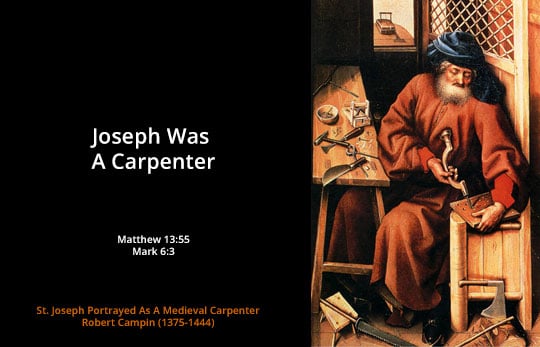Bible Question:
Was Joseph a carpenter or stone mason?
Bible Answer:
Stories and poems have been written about Joseph the carpenter. Poems have been written about Jesus as a carpenter too! But were they actually carpenters or were they masons or metallurgists? In order to resolve this question, we need to ask what did the Greek word actually mean that is translated as carpenter in most Bibles? What follows is an explanation of the meaning of this Greek word.

Modern Bibles Say Joseph Was A Carpenter
Both Matthew and Mark state that Joseph was a carpenter.
Is not this the carpenter’s son? Is not His mother called Mary, and His brothers, James and Joseph and Simon and Judas? Matthew 13:55 (NASB)
Is not this the carpenter, the son of Mary, and brother of James and Joses and Judas and Simon? Are not His sisters here with us?” And they took offense at Him. Mark 6:3 (NASB)
The Greek word that is translated as carpenter in both Matthew 13:55 and Mark 6:3 is tekton. It is important to note that the 1611 KJV Bible and all of our modern Bible translated tekton as carpenter. Yet, many Christians claim that Joseph and Jesus were masons or metallurgists. Lets examine the evidence.
Evidence From Biblical Greek Scholars
Verlyn D. Verbrugge explains that tekton could refer to a carpenter, stone mason or metallurgist in classical Greek as well as in the Old and New Testaments. Here are two quotes that introduce the meaning of this word.
In cl. Greek tekton means a craftsman or builder in wood, stone or metal.
Though carpenter is the common rendering here, tekton can also mean mason . . .[1]
J. I. Packer also states that tekton means ” craftsman or builder in wood, stone or metal.”[2]
But Louw and Nida state that the meaning of the word tekton is simpler,
There is every reason to believe that in biblical times one who was regarded as a tekton would be skilled in the use of wood and stone and possibly even metal.[3]
Danker and Bauer make the point that tekton usually or primarily referred to a woodworker. Stone mason or metal worker was not the primary meaning.
“. . . one who constructs, builder or carpenter” and “one who works with wood, in contrast to a worker in bronze.”[4]
Balz and Schneider cite many references that indicate the most common meaning of the Greek word tekton in the time of Christ was a carpenter. They state,
Τέκτων refers to “one who makes, produces” (Latin faber), esp. when referring to woodworking (cf. Homer Il. 6.315; Plato R x.597d; Josephus Ant. xv.390; τέκτων ξύλων και τέκτων λίθων, 2 Kgdms 5:11; cf. 1 Christian 22:15; τέκτων και ἀρχιτέκτων, Sir 38:27)[5]
Moulton and Milligan, referring to tekton, agree with this comment,
The ordinary limitation of this word to “a worker in wood,” “a carpenter,” as in Mat 13:55, Mk 6:3, is supported by P Fay 110 (A.D. 94).[6]
Then the authors continue to provide numerous references from the papyri to support this conclusion.
Their conclusion is also supported by the early church father Justin Martyr (A.D. 110-165). He gives strong reason to believe that Joseph and Jesus were carpenters.
And when Jesus came to the Jordan, He was considered to be the son of Joseph the carpenter; and He appeared without comeliness, as the Scriptures declared; and He was deemed a carpenter (for He was in the habit of working as a carpenter when among men, making ploughs and yokes . . .)[7]
Justin Martyr, who lived very close to the time of Christ, understood that Jesus was a carpenter.
Conclusion:
If Justin Martyr is correct, then Joseph and Jesus were primarily carpenters and as Lou and Nida have stated they probably also worked with masonry and metal in order to make items of wood. Many modern woodworkers also have secondary skills in masonry and metal since items constructed primarily of wood often have parts made of metal or stone or must be secured to something else with metal or stone.
Whatever skills Joseph and Jesus had they were hard working men. They were laborers and not men of the aristocracy. Most likely their primary skill was that of a carpenter as evidenced by the historical data above. John Nolland in his commentary on Matthew provides the best conclusion,
A carpenter (τέκτων) was typically a woodworking craftsman who built furniture and utensils, doors, and door frames, and prepared roofing beams; he may at times have doubled as a brick mason.[8]
References:
1. Verlyn D. Verbrugge. New International Dictionary of New Testament Theology. Zondervan Publishing. 2000. p. 558.
2. J. I. Packer, “Carpenter, Builder, Workman, Craftsman, Trade,” ed. Lothar Coenen, Erich Beyreuther, and Hans Bietenhard, New International Dictionary of New Testament Theology (Grand Rapids, MI: Zondervan Publishing House, 1986), 279.
3. Louw and Nida. Greek-Lexicon of the New Testament Based on Semantic Domains. United Bible Societies. 1989. vol. 1, p. 520.
4. Danker and Bauer. Greek-Lexicon of the New Testament and Other Early Christian Literature. University Chicago Press. 1979. p. 995.
5. Balz and Schneider. Exegetical Dictionary of the New Testament. Eerdmans Publishing. 1993. vol. 3., 342.
6. Moulton and Milligan. Vocabulary of the Greek Testament. Hendrickson Publishers. 1997. pp. 628-629.
7. Justin Martyr. Dialogue With Trypho. 88. Roberts and Donaldson. Ante-Nicene Fathers. Hendrickson Publishers. 1995. p. 244.
8. John Nolland. The Gospel of Matthew. The New International Greek Testament Commentary. Paternoster Press. 2005. p. 575.
Suggested Links:
What do we know about the life of Joseph?Joseph’s Genealogy
Joseph’s Dream
Jesus Is Born In Bethlehem
Jesus’ Dedication In The Temple
Arrival of the Magi To Visit Christ
Path To Nazareth
Jesus’ Youth